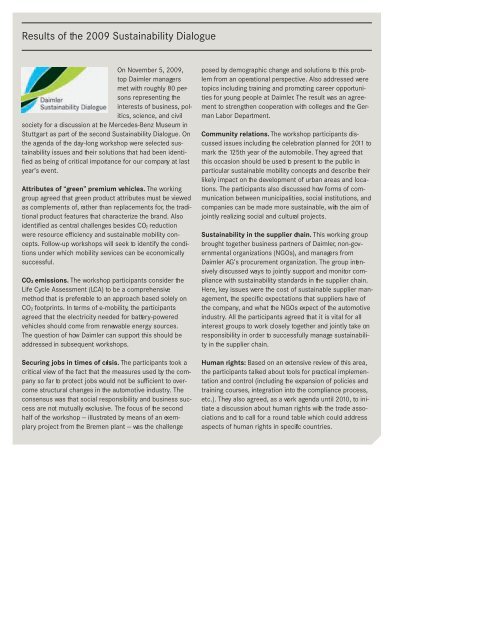Daimler Sustainability Report 2010 - Daimler Sustainability Report ...
Daimler Sustainability Report 2010 - Daimler Sustainability Report ...
Daimler Sustainability Report 2010 - Daimler Sustainability Report ...
You also want an ePaper? Increase the reach of your titles
YUMPU automatically turns print PDFs into web optimized ePapers that Google loves.
Results of the 2009 <strong>Sustainability</strong> Dialogue<br />
On November 5, 2009,<br />
top <strong>Daimler</strong> managers<br />
met with roughly 80 persons<br />
representing the<br />
interests of business, politics,<br />
science, and civil<br />
society for a discussion at the Mercedes-Benz Museum in<br />
Stuttgart as part of the second <strong>Sustainability</strong> Dialogue. On<br />
the agenda of the day-long workshop were selected sustainability<br />
issues and their solutions that had been identified<br />
as being of critical importance for our company at last<br />
year’s event.<br />
Attributes of “green” premium vehicles. The working<br />
group agreed that green product attributes must be viewed<br />
as complements of, rather than replacements for, the traditional<br />
product features that characterize the brand. Also<br />
identified as central challenges besides CO2 reduction<br />
were resource efficiency and sustainable mobility concepts.<br />
Follow-up workshops will seek to identify the conditions<br />
under which mobility services can be economically<br />
successful.<br />
CO2 emissions. The workshop participants consider the<br />
Life Cycle Assessment (LCA) to be a comprehensive<br />
method that is preferable to an approach based solely on<br />
CO2 footprints. In terms of e-mobility, the participants<br />
agreed that the electricity needed for battery-powered<br />
vehicles should come from renewable energy sources.<br />
The question of how <strong>Daimler</strong> can support this should be<br />
addressed in subsequent workshops.<br />
Securing jobs in times of crisis. The participants took a<br />
critical view of the fact that the measures used by the company<br />
so far to protect jobs would not be sufficient to overcome<br />
structural changes in the automotive industry. The<br />
consensus was that social responsibility and business success<br />
are not mutually exclusive. The focus of the second<br />
half of the workshop — illustrated by means of an exemplary<br />
project from the Bremen plant — was the challenge<br />
posed by demographic change and solutions to this problem<br />
from an operational perspective. Also addressed were<br />
topics including training and promoting career opportunities<br />
for young people at <strong>Daimler</strong>. The result was an agreement<br />
to strengthen cooperation with colleges and the German<br />
Labor Department.<br />
Community relations. The workshop participants discussed<br />
issues including the celebration planned for 2011 to<br />
mark the 125th year of the automobile. They agreed that<br />
this occasion should be used to present to the public in<br />
particular sustainable mobility concepts and describe their<br />
likely impact on the development of urban areas and locations.<br />
The participants also discussed how forms of communication<br />
between municipalities, social institutions, and<br />
companies can be made more sustainable, with the aim of<br />
jointly realizing social and cultural projects.<br />
<strong>Sustainability</strong> in the supplier chain. This working group<br />
brought together business partners of <strong>Daimler</strong>, non-governmental<br />
organizations (NGOs), and managers from<br />
<strong>Daimler</strong> AG’s procurement organization. The group intensively<br />
discussed ways to jointly support and monitor compliance<br />
with sustainability standards in the supplier chain.<br />
Here, key issues were the cost of sustainable supplier management,<br />
the specific expectations that suppliers have of<br />
the company, and what the NGOs expect of the automotive<br />
industry. All the participants agreed that it is vital for all<br />
interest groups to work closely together and jointly take on<br />
responsibility in order to successfully manage sustainability<br />
in the supplier chain.<br />
Human rights: Based on an extensive review of this area,<br />
the participants talked about tools for practical implementation<br />
and control (including the expansion of policies and<br />
training courses, integration into the compliance process,<br />
etc.). They also agreed, as a work agenda until <strong>2010</strong>, to initiate<br />
a discussion about human rights with the trade associations<br />
and to call for a round table which could address<br />
aspects of human rights in specific countries.



